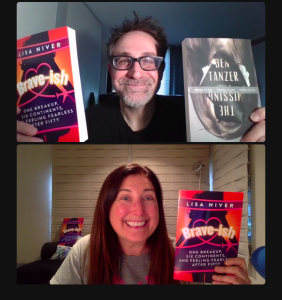Siskel and Ebert meet Joan Didion
 Congratulations to Ben Tanzer
on his new book,
After Hours: Scorsese, Grief and the Grammar of Cinema
.
Congratulations to Ben Tanzer
on his new book,
After Hours: Scorsese, Grief and the Grammar of Cinema
.

After Hours: Scorsese, Grief and the Grammar of Cinema is a live wire examination of author Ben Tanzer���s relationship to Martin Scorsese���s famous 1985 film, and how it helped him to make sense of the death of his father. Tanzer also delves into the overall importance of Scorsese and his films to his family, using After Hours as a lens into his life decisions���most particularly in the form of late-night visits to downtown New York City in the 1980s when he first came of age and began to ask himself how one manages to live a life of meaning, excitement, exploration, and joy.

EXCERPT: After Hours: Scorsese, Grief and the Grammar of Cinema, a mix of grief memoir and film criticism.
I grew up in a family where movies provided the lens into the where���s and when���s of who we were and what we were doing, as well as allowing us to make sense of those where���s and when���s.
My first movie? Fran��ois Truffaut���s The Wild Child���age two. After seeing the film, my therapist mother asked me what I thought it was about and I replied, ���the boy wanted to go home.���
Isn���t that the way it is with movies though? We want to escape, something���drudgery, feeling trapped���and we want to return to something as well���calm, pleasure, a place that makes sense.
Which is what After Hours is about. An office drone named Paul Hackett, portrayed by Griffin Dunne, heads down to SoHo in New York City to briefly escape his redundant, insular, and boring life, and when he wants to go home, he can���t find his way there, despite how hard he tries.
Is that description of the movie too simple or reductionist?
Of course.
Is it accurate?
Totally.
Why does it mean something to me?
You���ll see.
One thing I know is that After Hours���and Martin Scorsese���meant something to my mother and my father, both New Yorkers and Jews, both cineastes.
My father is long dead now, which I share because this book is about a lot of things he cared about���After Hours, Scorsese, cinema���s importance to our lives, creativity, genius, New York City, chaos, balance, memory, living an artistic life where one feels some kind of control over their destiny���none of which Paul Hackett feels, nor what Scorsese felt when he decided to make the film.
This work is also about grief���how it never goes away, and how we adapt to loss by simultaneously embracing it and pushing through it���something I want to believe can be as
organic as anything I���m attempting here.
~
Does it mean something that Scorsese was interviewed in Deadline in 2023 in relation to the release of Killers of the Flower Moon and had the following exchange:
DEADLINE: You���re 80. Do you still have that fire to get right back behind the camera and get the next one going?
SCORSESE: Got to. Got to. Yeah. I wish I could take a break for eight weeks and make a film at the same time [laughs]. The whole world has opened up to me, but it���s too late. It���s too late.
DEADLINE: What do you mean by that?
SCORSESE: I���m old. I read stuff. I see things. I want to tell stories, and there���s no more time. Kurosawa, when he got his Oscar, when George [Lucas] and Steven [Spielberg] gave it to him, he said, ���I���m only now beginning to see the possibility of what cinema could be, and it���s too late.��� He was 83. At the time, I said, ���What does he mean?��� Now I know what he means.
To create.
To escape.
To live a creative life, we must live long enough to accomplish these things.
Scorsese is 80.
Kafka was 41 when he died.
My father was 59.
I���m 54 at the time of this writing.
How many masterpieces does one have to create?
The answer is there���s never enough time.
One day near the end of my father���s life, a young rebbe, his daughters and one of his followers came to the hospital to perform a Rosh Hashanah service. As the girls sang and the follower blew the shofar, my father silently cried. He hardly ever cried during his lifetime���too proud, too tightly wrapped in emotions, fears, and limitations. After the service my mother asked me if I thought my father might���ve been better able to stretch himself as an artist if he hadn���t been so
trapped in his own head. We won���t know the answer to this, just as we won���t know what comes next for Paul Hackett at the end of After Hours as he goes back to work.
~

BEN TANZER
Emmy-award winner Ben Tanzer’s acclaimed work includes the short story collection UPSTATE, the science fiction novel Orphans and the essay collections Lost in Space and Be Cool. His recent novel The Missing was released in March 2024 by 7.13 Books and was a Chicago Writers Association Book of the Year finalist in the category of Traditional Fiction and his forthcoming book After Hours: Scorsese, Grief and the Grammar of Cinema, which Kirkus Reviews calls “A heartfelt if overstuffed tribute to the author���s father and the ameliorative power of art,” will be released from Ig Publishing in May 2025. Ben lives in Chicago with his family.
MORE FROM BEN TANZER:
Website: https://www.tanzerben.com/
Facebook: https://www.facebook.com/BenTanzer
Twitter: https://x.com/BenTanzer
Instagram: https://www.instagram.com/tanzerben/
TikTok: https://www.tiktok.com/@booksbybentanzer

Thank you to Ben Tanzer for interviewing me on his podcast, THIS PODCAST WILL CHANGE YOUR LIFE, about my memoir, BRAVE-ish!
LISTEN HERE
View this post on InstagramA post shared by Lisa Niver
(@lisaniver)
Siskel and Ebert meet Joan Didion in Auteur, a unique series that combines in-depth film criticism with personal autobiography. Each book in the series examines a single movie through a critical and historical lens, filtered through the author���s creative and emotional connection to the film. The result mixes literary memoir with a loving study of some of our most beloved and influential films.
After Hours: Scorsese, Grief and the Grammar of Cinema is a live wire examination of author Ben Tanzer���s relationship to Martin Scorsese���s famous 1985 film, and how it helped him to make sense of the death of his father. Tanzer also delves into the overall importance of Scorsese and his films to his family, using After Hours as a lens into his life decisions���most particularly in the form of late-night visits to downtown New York City in the 1980s when he first came of age and began to ask himself how one manages to live a life of meaning, excitement, exploration, and joy.
Emmy-award winner Ben Tanzer���s acclaimed work includes the short story collection Upstate, the science fiction novel Orphans and the essay collections Lost in Space and Be Cool. Ben is a storySouth and Pushcart nominee, a finalist for the Annual National Indie Excellence and Eric Hoffer Book Awards, a winner of the Devil���s Kitchen Literary Festival Nonfiction Prose Award and a Midwest Book Award. He also received an Honorable Mention at the Chicago Writers Association Book Awards for Traditional Non-Fiction and a Bronze Medal from the Independent Publisher Book Awards. He���s written for Hemispheres, Punk Planet, Men���s Health, and The Arrow, AARP���s GenX newsletter. His latest novel, The Missing, was released in March 2024. Ben lives in Chicago with his family.
The post Siskel and Ebert meet Joan Didion appeared first on We Said Go Travel.
We Said Go Travel
We Said Go Travel is a global community of over sixteen hundred writers with articles from every continent.
Stories are shared with photos and video from a perspective of the transformative power of travel. We Said Go Travel has hosted live and online events as well as travel writing contests around the world. ...more
- Lisa Niver's profile
- 57 followers



